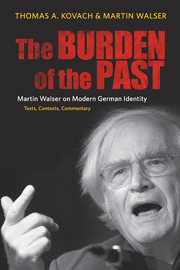Book contents
- Frontmatter
- Contents
- Acknowledgments
- The Burden of the Past
- Introduction
- Our Auschwitz (1965)
- No End to Auschwitz (1979)
- Handshake with Ghosts (1979)
- Speaking of Germany (A Report) (1988)
- Experiences while Composing a Sunday Speech: The Peace Prize Speech (1998)
- On Talking to Yourself: A Flagrant Attempt (2000)
- Conclusion
- Suggestions for Further Reading
- Index
Introduction
Published online by Cambridge University Press: 05 February 2013
- Frontmatter
- Contents
- Acknowledgments
- The Burden of the Past
- Introduction
- Our Auschwitz (1965)
- No End to Auschwitz (1979)
- Handshake with Ghosts (1979)
- Speaking of Germany (A Report) (1988)
- Experiences while Composing a Sunday Speech: The Peace Prize Speech (1998)
- On Talking to Yourself: A Flagrant Attempt (2000)
- Conclusion
- Suggestions for Further Reading
- Index
Summary
ON OCTOBER 11, 1998, MARTIN WALSER, one of the most prominent of the postwar generation of German writers, gave a speech at St. Paul's Church in Frankfurt am Main as he formally accepted the “Peace Prize of the German Book Trade.” This speech, which took place in a historically weighty setting — the church had been the site of the German National Assembly during the 1848 revolution, arguably the first (albeit short-lived) democratic institution in German history — addressed what Walser called the exploitation of the Holocaust, the use of Holocaust remembrance by unnamed individuals to keep Germans in a perpetual state of guilt. The speech was received by the assembled notables with a standing ovation, with one significant exception: Ignatz Bubis, the president of the Central Council of Jews in Germany, attacked Walser in the press the next day for making incendiary comments designed (in Bubis's view) to stir up ultra-nationalist and antisemitic elements among the general public. This led to a rather ugly public debate between Walser and Bubis, one that to this day remains a milestone in the troubled history of Germany's struggle to come to terms with the Nazi past. Despite Bubis's attempts to defuse the acrimony, finally even withdrawing his comment about the incendiary nature of the speech, a bitter aftertaste remained.
Shortly before his death in August of the following year, Bubis, who had devoted much of his adult life to strengthening the position of the Jewish community in Germany and insisting on the possibility of post-Holocaust Jewish life in Germany, lamented in an interview that his life's work had been in vain, and requested that he be buried in Israel.
- Type
- Chapter
- Information
- The Burden of the PastMartin Walser on Modern German Identity: Texts, Contexts, Commentary, pp. 1 - 4Publisher: Boydell & BrewerPrint publication year: 2008



